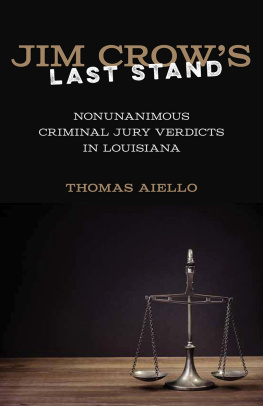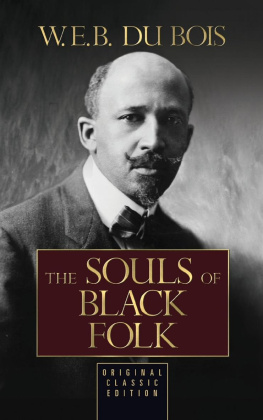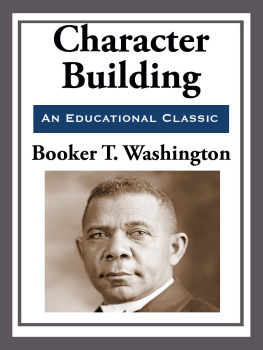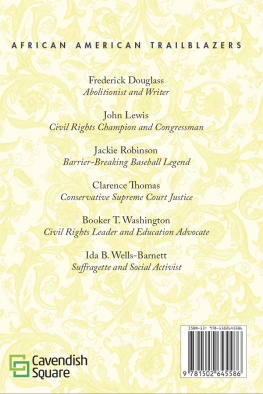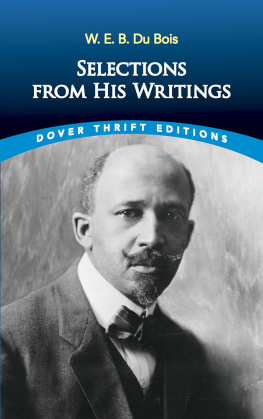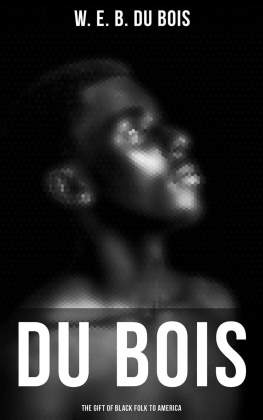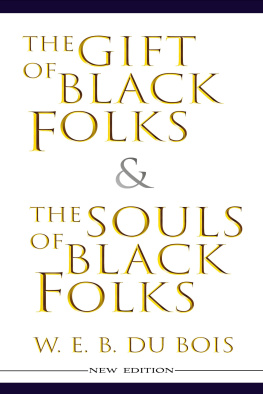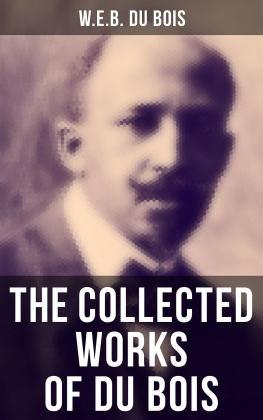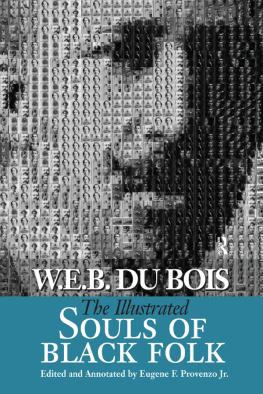THE BATTLE FOR THE SOULS OF BLACK FOLK
W.E.B. Du Bois, Booker T. Washington, and the Debate That Shaped the Course of Civil Rights
Thomas Aiello

Copyright 2016 by Thomas Aiello
All rights reserved. No part of this publication may be reproduced, stored in a retrieval system, or transmitted, in any form or by any means, electronic, mechanical, photocopying, recording, or otherwise, except for the inclusion of brief quotations in a review, without prior permission in writing from the publisher.
Library of Congress Cataloging-in-Publication Data
Names: Aiello, Thomas, 1977 author.
Title: The battle for the souls of Black folk : W.E.B. Du Bois, Booker T. Washington, and the debate that shaped the course of civil rights / Thomas Aiello. Other titles : W.E.B. Du Bois, Booker T. Washington, and the debate that shaped the course of civil rights.
Description: Santa Barbara, California : Praeger, an imprint of ABC-CLIO, LLC, [2016] | Includes bibliographical references and index.
Identifiers: LCCN 2016000777 | ISBN 9781440843570 (hard copy : alk. paper) | ISBN 9781440843587 (ebook)
Subjects: LCSH: Du Bois, W.E.B. (William Edward Burghardt), 18681963. | Du Bois, W.E.B. (William Edward Burghardt), 18681963Political and social views. | Washington, Booker T., 18561915. | Washington, Booker T., 18561915Political and social views. | African American civil rights workersBiography. | African American intellectualsBiography. | African American leadershipHistory20th century. | African AmericansCivil rightsHistory20th century. | African AmericansIntellectual life20th century. | Civil rights movementsUnited StatesHistory.
Classification: LCC E185.97.D73 A84 2016 | DDC 323.092/2 [B]dc23 LC record available at https://lccn.loc.gov/2016000777
ISBN: 978-1-4408-4357-0
EISBN: 978-1-4408-4358-7
20 19 18 17 16 1 2 3 4 5
This book is also available as an eBook.
Praeger
An Imprint of ABC-CLIO, LLC
ABC-CLIO, LLC
130 Cremona Drive, P.O. Box 1911
Santa Barbara, California 93116-1911
www.abc-clio.com
This book is printed on acid-free paper 
Manufactured in the United States of America
The author wishes to thank the following for reprint permission:
Crisis Publishing Co., Inc., the publisher of the magazine of the National Association for the Advancement of Colored People, for the use of material first published in the September 1924, March 1926, July 1927, February 1929, June 1929, and June 1931 issues of Crisis .
University of Massachusetts Press, the publisher of The Correspondence of W.E.B. Du Bois, Volume 1: Selections, 18771934 . Copyright 1973 by the University of Massachusetts Press.
Howard University, the publisher of W.E.B. Du Bois (1932). Education and work. The Journal of Negro Education , 1, 6074.
University of Chicago Press, the publisher of Ida B. Wells, Crusade for Justice: The Autobiography of Ida B. Wells , ed. Alfreda M. Duster. Chicago: University of Chicago Press, 1970, pp. 261268, 280281, 321324, 329331.
for Soo
A conversation is a dialogue, not a monologue. Thats why there are so few good conversations: due to scarcity, two intelligent talkers seldom meet.
Truman Capote
This may look to outsiders as a petty squabble of thoughtless self-seekers. It is in fact the life and death struggle of nine million men.
W.E.B. Du Bois
Contents
Preface
I remember as a student so many years ago first encountering Studs Terkels The Good War . It was a tremendously affecting portrait of World War II for someone who was not tremendously affected by war stories. Unlike other analyses of the conflict, Terkels gave us a virtually silent narrator, steering the narrative through his questions but otherwise allowing the participants themselves to tell their stories, the collective whole standing as testament to what the fight against fascism was like for so many, from so many places in so many different situations. Although those stories provided his account with a particular intimacy, their combination also had larger arguments to make about the conduct of the war, racism in the military, the tensions that ultimately became the Cold War, and many other aspects of the fight. It was not simply a combination of intimate stories and big ideas. It was the use of intimate stories to find them.
Terkels was a work of oral history. This is not. But it is still a story told by the participants. Inspired by the work of Studs Terkel, as well as more recent histories by James Andrew Miller and Tom Shales, I have tried to tell the story of the debate between W.E.B. Du Bois and Booker T. Washington by presenting their own voices. In other analyses of the leaders, that debate is treated as one motivating factor in a larger whole that theorizes the role of protest in early century rights debates, economic nationalism in the progressive era, and so many other realities of black life in the wake of Jim Crow retrenchment. Rightly so. Many of those studies appear in the notes to this volume. What this volume is doing, however, is fundamentally different. It seeks, like Terkel, to find those big ideas through intimacy. It tells the story of the ideological and personal battle between Du Bois and Washington through the stories told by them, their allies, aides, and enemies.
Unlike Terkel, of course, and unlike Miller and Shales, I was not able to interview the participants. Instead, I have used their writings and the writings of others, both published and unpublished, public and private, to shape a portrait of the conversation. Oral history, of course, has its own theory and development that is not included here. This is not oral history. But it is, I hope, a completely different way of viewing a controversy that defined the lives of both Du Bois and Washington, set the strategic considerations for how black America would respond to Jim Crow, and created the two distinct theoretical lines that would define the quest for civil rights throughout the 20th century. And it provides the best measure of its two main participants because each is allowed to present his own case.
This book begins by allowing them to introduce themselves, establishing their development in the decades before the seminal year of 1895, when Frederick Douglass died, Washington made his infamous Atlanta Compromise speech at the Cotton States Exposition, and Du Bois completed his doctorate from Harvard. The book moves chronologically from there, describing the first sustained contact between Washington and Du Bois, when the latter began searching for teaching jobs after the completion of his degree. The first real rift between the two occurred in 1898, when criticism of Washington from Boston rights advocates (and friends of Du Bois) led Tuskegees leader to resign from the board of an Alabama industrial school founded by a friend of Du Bois. It grew from there. Du Bois felt slighted when he did not get a job recommendation from Washington for a school superintendency in the nations capital, then Washington plagiarized his National Negro Business League from a format developed by Du Bois and his colleagues at Atlanta University. Washington published his autobiography Up From Slavery in 1901, then Du Bois issued a scathing critique of it later that year. In 1903, Du Bois published his The Souls of Black Folk and included an essay deriding Washington, then William Monroe Trotter and other Du Bois allies interrupted a Washington address to the Boston chapter of the National Negro Business League later that year.
, when Washington made statements about improving U.S. race relations while on tour in England, and Du Bois responded with an open letter to the British denying his counterparts optimism.
Next page

